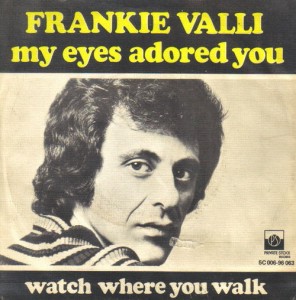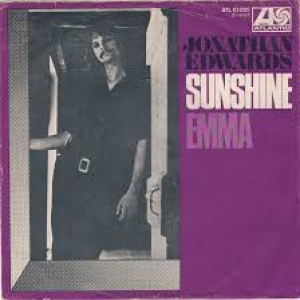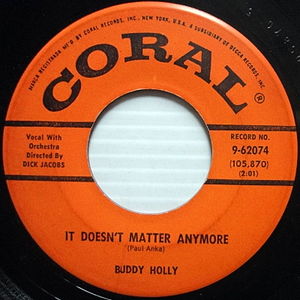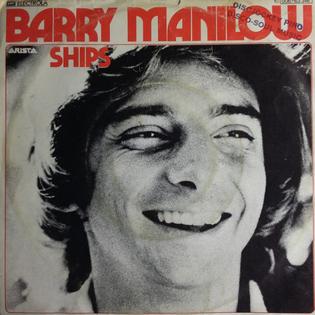
"Bye, Bye, Baby " is a popular song written by Bob Crewe and Bob Gaudio, a member of The Four Seasons, whose version of the song made it to No. 1 in Canada and No. 12 on the US Billboard Hot 100 in 1965. On the original issue of the single, the title was "Bye Bye Baby"; on the album The 4 Seasons Entertain You, the name was changed to the longer, more familiar name. The song is about saying goodbye, not because the person is unloved but rather because the relationship is adulterous.

"White Christmas" is an Irving Berlin song reminiscing about an old-fashioned Christmas setting. The song was written by Berlin for the 1942 musical film Holiday Inn. The composition won the Academy Award for Best Original Song at the 15th Academy Awards.

"Breaking Up Is Hard to Do" is a song recorded by Neil Sedaka, co-written by Sedaka and Howard Greenfield. Sedaka recorded this song twice, in 1962 and 1975, in two significantly different arrangements, and it is considered to be his signature song. Between 1970 and 1975, it was a top-40 hit three separate times for three separate artists: Lenny Welch, The Partridge Family and Sedaka's second version.

"My Eyes Adored You" is a 1974 song written by Bob Crewe and Kenny Nolan. It was originally recorded by The Four Seasons in early 1974. After the Motown label balked at the idea of releasing it, the recording was sold to lead singer Frankie Valli for $4000. After rejections by Capitol and Atlantic Records, Valli succeeded in getting the recording released on Private Stock Records, but the owner/founder of the label, Larry Uttal, wanted only Valli's name on the label. The single was released in the US in November 1974 and topped the Billboard Hot 100 in March 1975. "My Eyes Adored You" also went to number 2 on the Easy Listening chart. Billboard ranked it as the No. 5 song for 1975.
"No Charge" is a country music song, written by songwriter Harlan Howard. It was first recorded by country singer Melba Montgomery, whose 1974 version was a #1 country hit in both the US and Canada, as well as making #39 on the US pop charts. In the UK, the song is associated with J.J. Barrie, whose 1976 version was a #1 UK hit.

"Who Loves You" is the title song of a 1975 album by The Four Seasons. It was composed by Bob Gaudio and Judy Parker and produced by Gaudio. It reached number 3 on the Billboard Hot 100 in November 1975.

"C'mon Marianne" is a song composed by L. Russell Brown and Raymond Bloodworth and popularized by The Four Seasons in 1967. Produced by Bob Crewe, the single was the last Four Seasons single to reach the Top Ten of the Billboard Hot 100 chart in the 1960s, and their last Top Ten hit until "Who Loves You" in 1975.

"Sunshine" is a country folk song from 1971 by Jonathan Edwards, released as the first single from his debut album Jonathan Edwards. The single reached #4 on the Billboard Hot 100 chart on January 15, 1972, and earned a gold record.

"We'll Sing in the Sunshine" is a 1964 hit song written and recorded by Gale Garnett which reached No. 2 in Canada, and No. 4 on the U.S. Billboard Hot 100 chart for the week ending 17 October 1964. It also enjoyed success on easy listening and country music radio stations, spending seven weeks at No. 1 on the Billboard Easy Listening chart and No. 42 on the country chart. The Cash Box Top 100 ranked "We'll Sing in the Sunshine" at No. 1 for the week of 31 October 1964, and it also reached No. 1 in Garnett's native New Zealand that November. In Australia, "We'll Sing in the Sunshine" afforded Garnett a Top Ten hit with a No. 10 peak in October 1964. Garnett's sole Top 40 hit, "We'll Sing in the Sunshine" won the Grammy Award for Best Ethnic or Traditional Folk Recording in 1965.

"My Melody of Love" is the title of a popular song from 1974 by the American singer Bobby Vinton. Vinton adapted his song from a German schlager song composed by Henry Mayer, and it appears on Vinton's album Melodies of Love. The song was also recorded by Spanish pop singer Karina as "Palabras de Cristal".

"If You Love Me (Let Me Know)" is a song written by John Rostill that was a 1974 hit single for Olivia Newton-John. It was her second release to hit the top 10 in the United States, reaching number 5 on the pop chart and number 2 on the Easy Listening chart. It also reached number 2 on the Billboard country chart. As with her single "Let Me Be There", Mike Sammes sings a bass harmony. It was nominated for the 1974 Country Music Association Award for Single of the Year.

"Do It Baby" is a 1974 single recorded and released by the Motown R&B group The Miracles. The song was taken from the album of the same name, and written by Motown staff songwriters Freddie Perren and Christine Yarian and produced by Perren.
"A Lover's Question" is a 1958 Pop, R&B hit for Clyde McPhatter. The single was written by Brook Benton and Jimmy T. Williams and was Clyde McPhatter's most successful Pop and R&B release. The bass singer is Noah Hopkins. "A Lover's Question" made it to #6 on the Billboard Hot 100 and was #1 for one week on the R&B chart.

"It Doesn't Matter Anymore" is a pop ballad written by Paul Anka and recorded by Buddy Holly in 1958. The song was issued in January 1959, less than a month before Holly's death. "It Doesn't Matter Anymore" reached number 13 as a posthumous hit on the Billboard Hot 100 chart in early 1959, shortly after Holly was killed in a plane crash on February 3, 1959. The single was a two-sided hit, backed with "Raining in My Heart". "It Doesn't Matter Anymore" was Holly's last US Top 20 hit and featured the orchestral backing of Dick Jacobs. It was also successful in the United Kingdom, where it became the country's first posthumous number 1 hit.
"Dream On" is a song written by Dennis Lambert and Brian Potter. In 1974, The Righteous Brothers had a hit version, reaching No. 32 on the Billboard Hot 100, and No. 6 on the U.S. and Canadian Adult Contemporary charts. Bill Medley and Bobby Hatfield alternate lead vocals.

You Lay So Easy on My Mind is the thirty-fourth studio album by American pop singer Andy Williams, released in November 1974 by Columbia Records. The idea for this LP was mentioned in an interview with Williams in the November 3, 1973, issue of Billboard magazine that emphasized his desire to move away from recording albums of Easy Listening covers of hits by other artists, noting that he was "planning an album to be cut in Nashville with Columbia's high-flying country-pop producer, Billy Sherrill." The article coincided with the release of his first attempt to shift directions, Solitaire, which performed poorly. A return to the Easy Listening hits formula, The Way We Were, followed in the spring of 1974 but failed to even chart, so this next attempt to eschew soft rock songs leaned heavily on Country hits.

"What Cha Gonna Do with My Lovin'" is a song by American singer and songwriter Stephanie Mills, released in July 1979 as the first single from the album of the same name (1979). It became a hit, reaching No. 22 on the US Billboard Hot 100. It was also a top 10 hit on the Billboard R&B chart, as well as a minor hit in Canada.

"Never Ending Song of Love" is a song written by Delaney Bramlett, and, according to some sources, by his wife Bonnie Bramlett. It was originally recorded with their band, Delaney & Bonnie & Friends, in 1971 on the album Motel Shot. Released as a single by Atco Records the same year, "Never Ending Song of Love" became Delaney & Bonnie's greatest hit on the pop charts, reaching a peak of No. 13 on the Billboard Hot 100 and No. 8 on Easy Listening. It reached No. 16 in Australia.

"Ships" is a song written and originally performed by British musician Ian Hunter. The song was first released on Hunter's fourth solo album, You're Never Alone with a Schizophrenic in March 1979, and later released as a single in August 1979. Hunter's release of the single never made the charts. The song is said to be about Ian's relationship with his father.

"9,999,999 Tears" is a 1976 hit single by Dickey Lee. The song was written and originally recorded by American country music artist Razzy Bailey. Originally entitled "9,999,999 Years", it was released as a non-album single in 1966 but did not reach the charts.

















